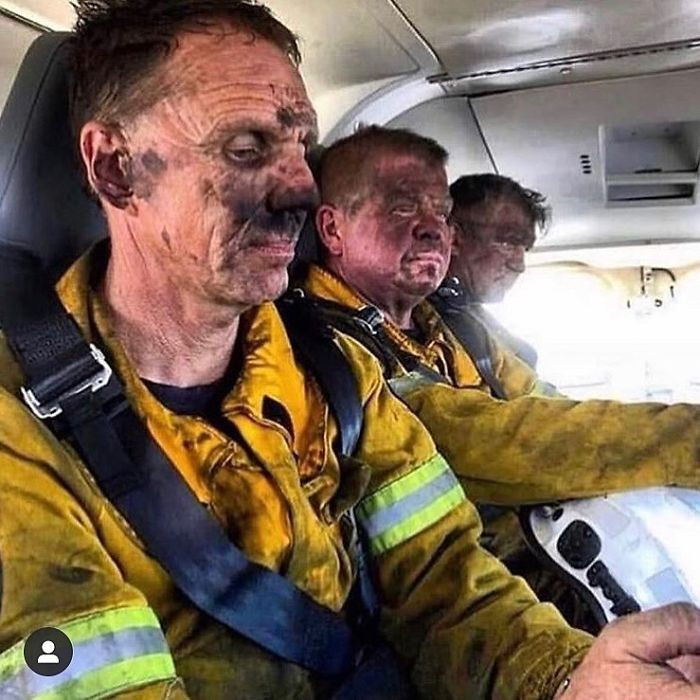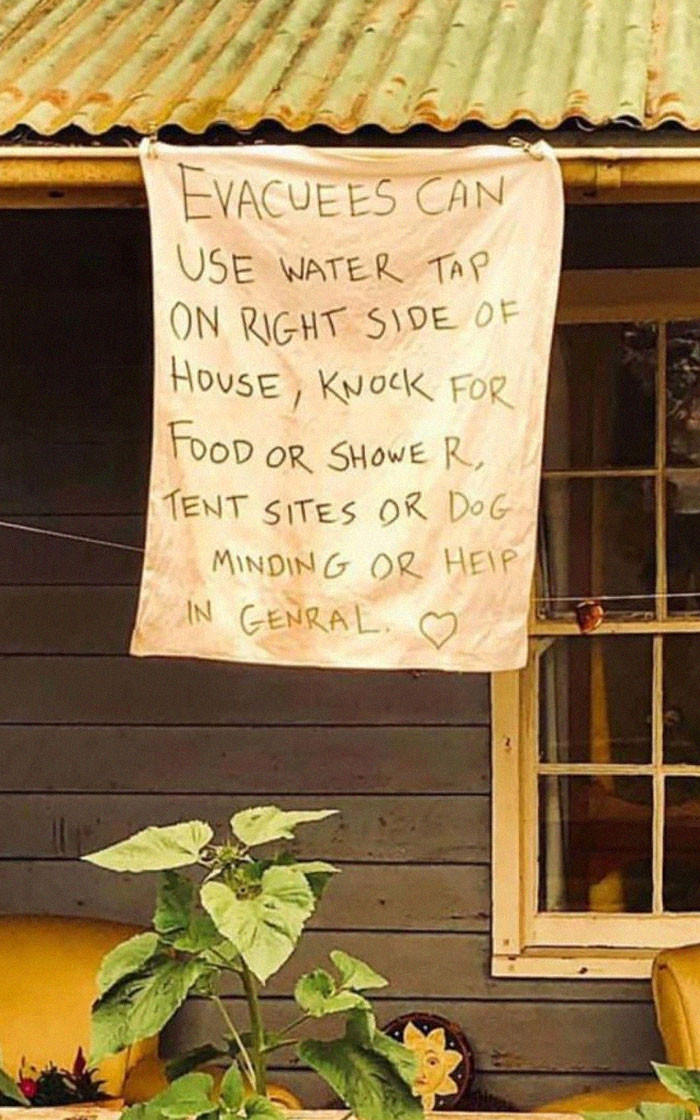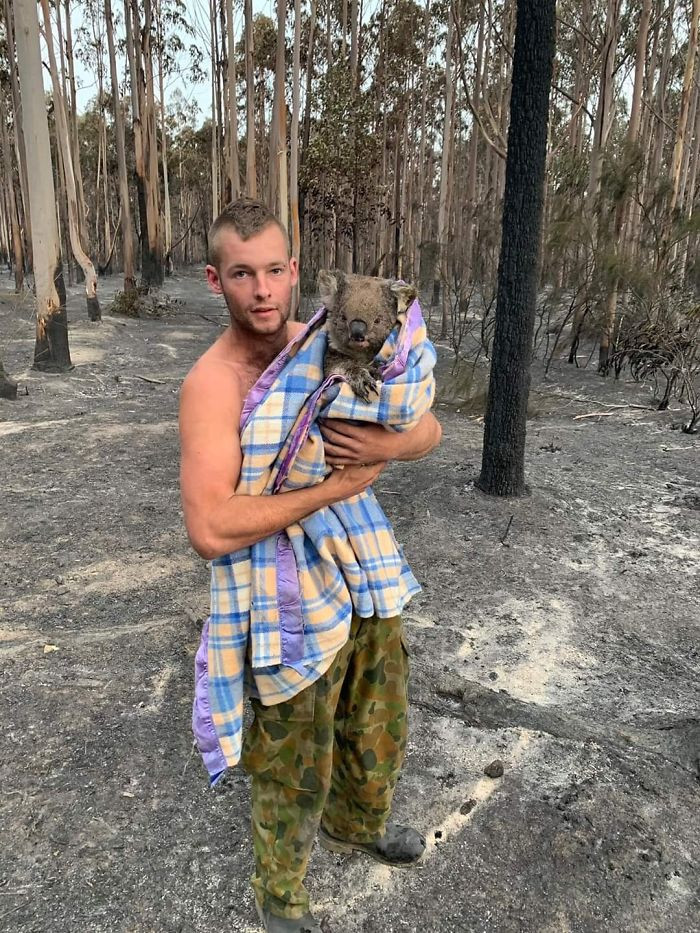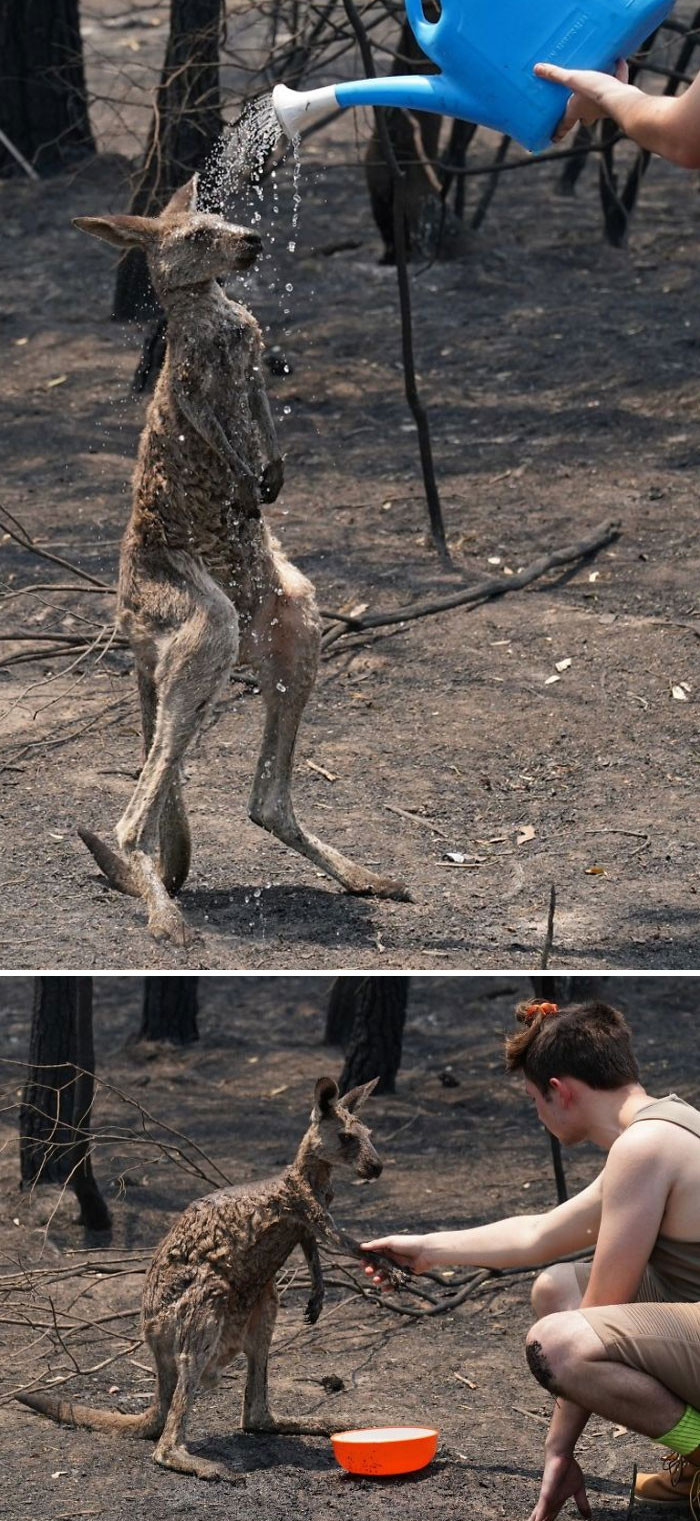Woman Suffers Agony As Blood Supply To Mouth Cut Off After 'Routine' Lip Filler Operation

These photos accurately depict the emotional gravity of the hellfire plaguing Australians right now.

In September of 2019, Australia kicked off one of the worst bush fire seasons the continent has ever seen.
According to CNN, so far 17.9 million acres of Australian land have been scorched.
Vox helped put those numbers in perspective with this quote: "That’s an area larger than West Virginia, and more than eight times the area that burned in California in 2018, the state’s most destructive year for wildfires."
However, that isn't even the most heart-wrenching statistic to come from the devastating flames.
Almost 2,000 homes have been destroyed, a number growing by the hundreds as the weeks linger on. Twenty-seven people have lost their lives.
And one of the most crushing stats is the estimated loss of animal life: 1 billion. Unfathomable.
There is also an understandable assumption by many in the scientific community that many of the ecosystems effected by the fires will have long-term consequences.
According to NY Times, Australia's firefighter force is largely composed of volunteer efforts, and their government is mostly expecting them to work without pay despite 12 hour shifts and now months on end without working. This sentiment has caused understandable outrage from the community towards their Prime Minister.
...Members of the Fire Brigade Employees Union, which represents firefighters in Australia, said at a news conference that it was “bewildering” that the government expected volunteer firefighters to work for months on end without compensation.
 pipmagazineau
pipmagazineauAccording to the Red Cross:
The pace at which the bushfires have spread and the subsequent heavy smoke have made it difficult for emergency services to access and evacuate some communities, at times forcing residents to flee to beaches and other water bodies to avoid impact and await rescue.
 grrrr12344
grrrr12344Sarah Legge, an ecologist at the Australian National University, is studying how animals respond to the fire and said:
Hundreds of species have been affected by these fires. That includes many dozens of threatened species; some of these will be brought to the brink of extinction as a result of this event. And if they’re not made extinct by this event, I think this is the beginning of the end for them. Because this event will reoccur. It’s awful. It will be ecosystem collapse in a lot of cases. And we’re not exactly sure what we’ll end up with at the end of it all.
 nomadofthewaves
nomadofthewavesAccording to Vox:
Australia is one of the great biodiversity hotspots in the world. The island continent was isolated from the rest of the world for millions of years, allowing evolution to take strange new paths, and until fairly recently, with little human influence.
 Matrix for Daily Mail Australia
Matrix for Daily Mail AustraliaAccording to Vox:
Australia’s government created a new National Bushfire Recovery Agency to help fund fire relief and authorized payments to volunteer firefighters, some of whom have now spent months on duty.
 cheryl2399
cheryl2399In some areas, the smoke in the air has the same impact upon inhaling as smoking almost 40 cigarettes.
 Alex Coppel
Alex CoppelDavid Smart, captain of the volunteer firefighters in the Kangaroo Valley, 100 miles south of Sydney, said last month:
I think everyone is very stressed. People are tired. It’s been going for weeks on end.
 boldstyle1
boldstyle1Did you know? Around 244 species of mammals are found only in Australia.
 KETKnbc
KETKnbcIn the past, "fire season" spread fires out over time and were easier to manage.
 Jenna O'Keeffe
Jenna O'KeeffeThe US Environmental Protection Agency explains where the biggest health threat from smoke comes from:
These microscopic particles can get into your eyes and respiratory system, where they can cause health problems such as burning eyes, runny nose, and illnesses such as bronchitis. Fine particles also can aggravate chronic heart and lung diseases — and even are linked to premature deaths in people with these conditions.
 Martin Von Stoll
Martin Von StollAccording to NY Times:
Sandra Lunardi, the acting chief executive of the Australasian Fire and Emergency Service Authorities Council, which coordinates firefighting efforts, said it would be difficult to institute a compensation system.
“To pay firefighters to be present in the numbers necessary and in the places necessary to give quick response to bush fires” in rural Australia was “a significant challenge, particularly when these fires are prolonged and frequent,” Ms. Lunardi wrote by email.
 Sumit316
Sumit316Baby kangaroos live in their mother's pouch for 8 to 11 months, depending on which breed they are.
 sammcglone
sammcgloneAccording to the Australian Bureau of Meteorology’s 2018 State of the Climate report:
Australia’s climate has warmed by just over 1° C since 1910, leading to an increase in the frequency of extreme heat events.
 DANIEL KNOX/HORSLEY PARK RURAL FIRE BRIGADE
DANIEL KNOX/HORSLEY PARK RURAL FIRE BRIGADEIncredible.
 Anthony Hearsey
Anthony HearseyAccording to Vox:
After a major disaster, studies find a 5 percent to 15 percent increase in the incidence of mental health problems among survivors. That means the impacts of these devastating blazes will linger long after the last embers are snuffed out.
 Caityface91
Caityface91National Geographic reports:
...Scientists fear that when rains eventually fall, they will wash charred debris into rivers, dams, and the ocean, killing wildlife and even tainting the drinking supplies of major cities, such as Sydney.
 Melissa Ericksen
Melissa Ericksen
The Red Cross reports:
“The intensity and size of bushfires in some areas has led to the creation of their own weather systems generating pyrocumulonimbus clouds, trapping heat and generating strong wind and lightning strikes, in turn sparking further fires.”
 Jaykoyote123
Jaykoyote123
Ross Thompson, a freshwater ecologist at the University of Canberra told Nat Geo:
Disturbance on this scale is almost certainly going to impact biodiversity. I’m remarkably worried about the effects on freshwater ecosystems.
 GallowBoob
GallowBoob
Emma Johnston, a marine ecologist at UNSW told Nat Geo:
The scale of these fires are unprecedented, and the images we are seeing of ash- and soot-laden waves along our beaches indicate that there is a very high density in the water column, so that is likely to have localized effects in those areas.
 Geng68
Geng68
David Bowman, the director of the Fire Centre Research Hub at the University of Tasmania, told TIME:
We’re in the middle of a war situation…mass evacuations, the involvement of the military, hugely exhausted firefighting campaigns, it’s difficult to explain.
 aggressivemagpie
aggressivemagpie
Bowman also said:
The intensity, the scale, the number, the geographical range, the fact that they’re occurring simultaneously, and the sorts of environments that are burning are all extraordinary
 davetawil
davetawil
Firefighters from both Canada and the United States have flown into Australia to help aid in firefighting efforts.
 Vondecoy
Vondecoy
The #nofilter hashtag has been startling as it makes it's way across social media. The colors in the sky could shake you to your core.
 alonelysaber
alonelysaber
Victoria’s state emergency commissioner Andrew Crisp said:
It is pitch-black. It is quite scary… the community right now is under threat, but we will hold our line and they will be saved and protected.
 gordogamsby
gordogamsby
According to Vox:
The smoke is so plentiful that NOAA reports it’s “in the process of circumnavigating the planet,” showing up over South America after being pushed there by the wind.
 FranklinFox
FranklinFox
Most of New Zealand is able to visibly see the impact despite the distance between them.
 overcloseness
overcloseness
The last few years have been pretty brutal for fires, but Australia's bushfires are taking the cake right now.
 twkpsh
twkpsh
An incredible image, a brutal reality.
 greenpeace
greenpeace
A whole new world.
 potatoinmymouth
potatoinmymouth
It looks like the Apocalypse.
 travellingmidwife
travellingmidwife
The numbers continue to climb.
 Martin Von Stoll
Martin Von Stoll
It would be beautiful if it wasn't so horrifying.

Is this Hell?
 Hakko12345
Hakko12345
Kids grow up devastatingly fast in times of extreme events.
 ABC news
ABC news
Undoubtedly, the air quality has a long way to go now.
 Liam Ferrari
Liam Ferrari
This perspective is... hard.
 neilrkaye
neilrkaye
Almost unrealistic.
 whatisuniqueusername
whatisuniqueusername
Unfathomable.
 spiceprincesszen
spiceprincesszen
It could easily feel like the end of the world.
 DrAllure
DrAllure
It's hard when it's a little beautiful, but it's only a little beautiful from the safety of distance. The harsh reality is too much.
 Maxar Technologies/Handout via REUTERS
Maxar Technologies/Handout via REUTERS
"Happy" New Year
 KettyJ
KettyJ
This picture is stunning and horrifying.
 Josh Burkinshaw
Josh Burkinshaw
Burning. Burning.
 FlashoverAU
FlashoverAU
Intense colors.
 bbc
bbc
When there's enough fire to look like lava...
 ebony.badke
ebony.badke
It really does look like Hell.
 lockedshore
lockedshore
Beaches are supposed to be a source of fun and comfort.
 ALASTAIR PRIOR
ALASTAIR PRIOR
The perspectives are always intense.
 Haaazard
Haaazard
So. Much. Smoke.
 YowieDingo
YowieDingo
Very orange. Very scary.
 AcceptableJunket
AcceptableJunket
For people who feel helpless but want to help: The World Wildlife Fund is collecting donations to restore habitats for koalas impacted by the fires. You can also donate to the Australian Red Cross’s fire recovery and relief fund.
Share your thoughts in the comment section now.





